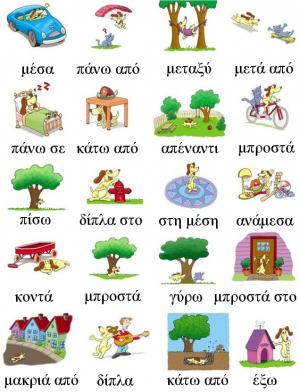Difference between revisions of "Language/Modern-greek-1453/Grammar/Greek-Adverbs"
| Line 20: | Line 20: | ||
|Τοπικά: Place | |Τοπικά: Place | ||
|Πού; Where? | |Πού; Where? | ||
|Εδώ : here, εκεί : there, επάνω : above, κάτω: under, μέσα : inside | | | ||
* Εδώ : here, εκεί : there, επάνω : above, κάτω: under, μέσα : inside | |||
έξω : out, πίσω : back, αυτού : there, αλλού : elsewhere | * έξω : out, πίσω : back, αυτού : there, αλλού : elsewhere | ||
* δεξιά : right, ανάμεσα : among… | |||
δεξιά : right, ανάμεσα : among… | |||
|- | |- | ||
|Χρονικά: | |Χρονικά: | ||
Time | Time | ||
|Πότε; when? | |Πότε; when? | ||
|τώρα : now , πριν : ago, χτες : yesterday, αύριο : tomorrow | | | ||
* τώρα : now , πριν : ago, χτες : yesterday, αύριο : tomorrow | |||
φέτος : this year, τότε : then, ύστερα : after, μετά : since | * φέτος : this year, τότε : then, ύστερα : after, μετά : since | ||
* σήμερα : today, μεθαύριο : after tomorrow | |||
σήμερα : today, μεθαύριο : after tomorrow | * πέρσι : last year, του χρόνου : next year | ||
* σε λίγο : soon, | |||
πέρσι : last year, του χρόνου : next year | * αργότερα : later, κατόπιν : consequently | ||
* έπειτα : following, αρχικά : firstly, τέλος : lastly | |||
σε λίγο : soon, | * πάντα : always /, ποτέ : never, κάπου : somewhere | ||
* συχνά : frequently | |||
αργότερα : later, κατόπιν : consequently | |||
έπειτα : following, αρχικά : firstly, τέλος : lastly | |||
πάντα : always /, ποτέ : never, κάπου : somewhere | |||
συχνά : frequently | |||
|- | |- | ||
|Τροπικά: | |Τροπικά: | ||
manner | manner | ||
|Πώς; how? | |Πώς; how? | ||
|Όπως : however, έτσι : so, αλλιώς : anders | | | ||
* Όπως : however, έτσι : so, αλλιώς : anders | |||
καθώς : while, μαζί : together, όμορφα : well | * καθώς : while, μαζί : together, όμορφα : well | ||
* ήσυχα : quietly, σαν : as | |||
ήσυχα : quietly, σαν : as | * αργά : slowly, γρήγορα : fast, σιγά : slowly | ||
* βιαστικά : hastily, καλώς : well | |||
αργά : slowly, γρήγορα : fast, σιγά : slowly | * αμέσως : immediately, συνήθως : usually | ||
βιαστικά : hastily, καλώς : well | |||
αμέσως : immediately, συνήθως : usually | |||
|- | |- | ||
|Βεβαιωτικά: | |Βεβαιωτικά: | ||
certainty | certainty | ||
|Ναι : yes | |Ναι : yes | ||
|Ναι : yes, μάλιστα : yes indeed, βέβαια : sure | | | ||
* Ναι : yes, μάλιστα : yes indeed, βέβαια : sure | |||
σωστά : correctly, μάλλον: perhaps, maybe | * σωστά : correctly, μάλλον: perhaps, maybe | ||
* βεβαίως : sûre, δεν : not, μη(ν) : not | |||
βεβαίως : sûre, δεν : not, μη(ν) : not | |||
|- | |- | ||
|Ποσοτικά : | |Ποσοτικά : | ||
| Line 75: | Line 62: | ||
|Πόσο; | |Πόσο; | ||
how much ? | how much ? | ||
|Όσο : while, τόσο : thus, περισσότερο : more, | | | ||
* Όσο : while, τόσο : thus, περισσότερο : more, | |||
λίγο : a little, πιο : most, αρκετά : rather, κάμποσο : enough | * λίγο : a little, πιο : most, αρκετά : rather, κάμποσο : enough | ||
* πολύ : much,καθόλου : not at all | |||
πολύ : much,καθόλου : not at all | |||
|} | |} | ||
Revision as of 22:37, 5 January 2023
Adverbs are indeclinable words which can modify a verb, an adjective, another adverb or even a whole sentence. They indicate place, time, manner, etc. Learning the Greek Adverbs displayed below is vital to the language. Greek adverbs are part of speech. Generally they're words that modify any part of language other than a noun. Adverbs can modify verbs, adjectives (including numbers), clauses, sentences and other adverbs.
What are adverbs used for?
The adverb is an invariable word that specifies or changes the meaning of a verb, an adjective, or another adverb. The adverb specifies the circumstances of place, time or manner in which the action presented by the verb takes place. Adverbs indicate the degree of a quality or defect and they give information about what the speaker thinks.
An adverb can be:
- simple words
- groups of words
- An adverbial phrase
Groups of adverbs
| Είδος: kind | Answer the question : | List of Adverbs |
|---|---|---|
| Τοπικά: Place | Πού; Where? |
|
| Χρονικά:
Time |
Πότε; when? |
|
| Τροπικά:
manner |
Πώς; how? |
|
| Βεβαιωτικά:
certainty |
Ναι : yes |
|
| Ποσοτικά :
quantity |
Πόσο;
how much ? |
|
Examples
See also this lesson: Language/Modern-greek-1453/Grammar/Greek-adverbs-through-examples
Author
- Ευγενική χορηγία που στοχεύει να βοηθήσει μαθητές ή μη, απανταχού της Γης, που επιδίδονται στην εκμάθηση της ελληνικής γλώσσας!
- Contribution bénévole visant à aider les personnes, partout dans le monde, qui sont engagées dans l'apprentissage de la langue grecque !
- Voluntary contribution aimed at helping people, all over the world, who are committed to learning the Greek language!
